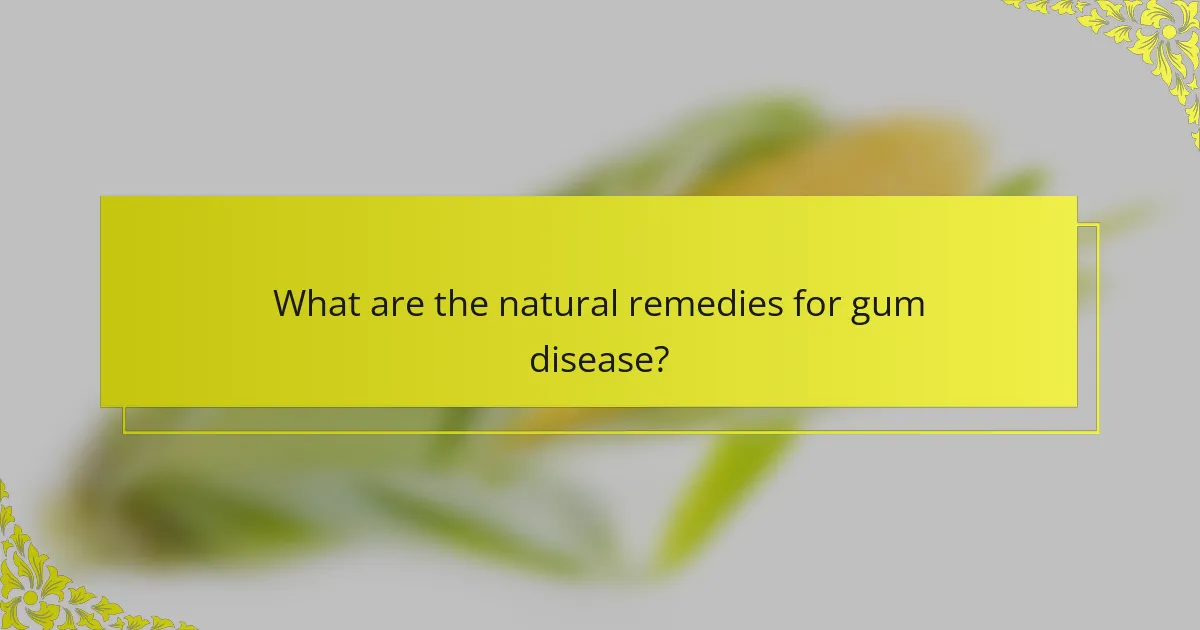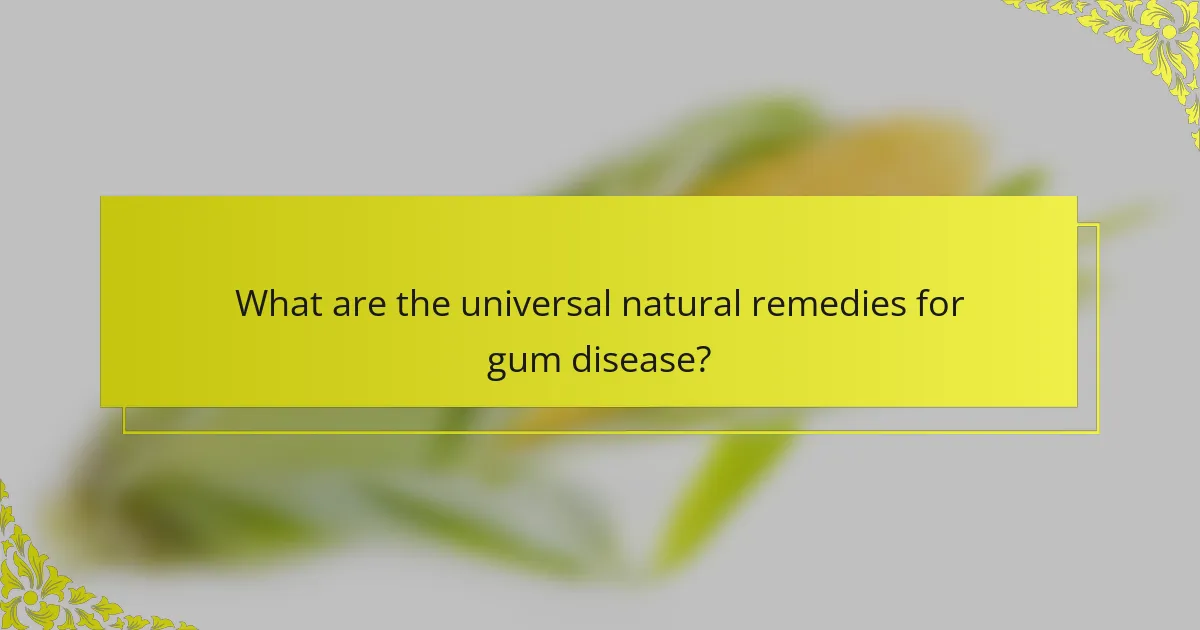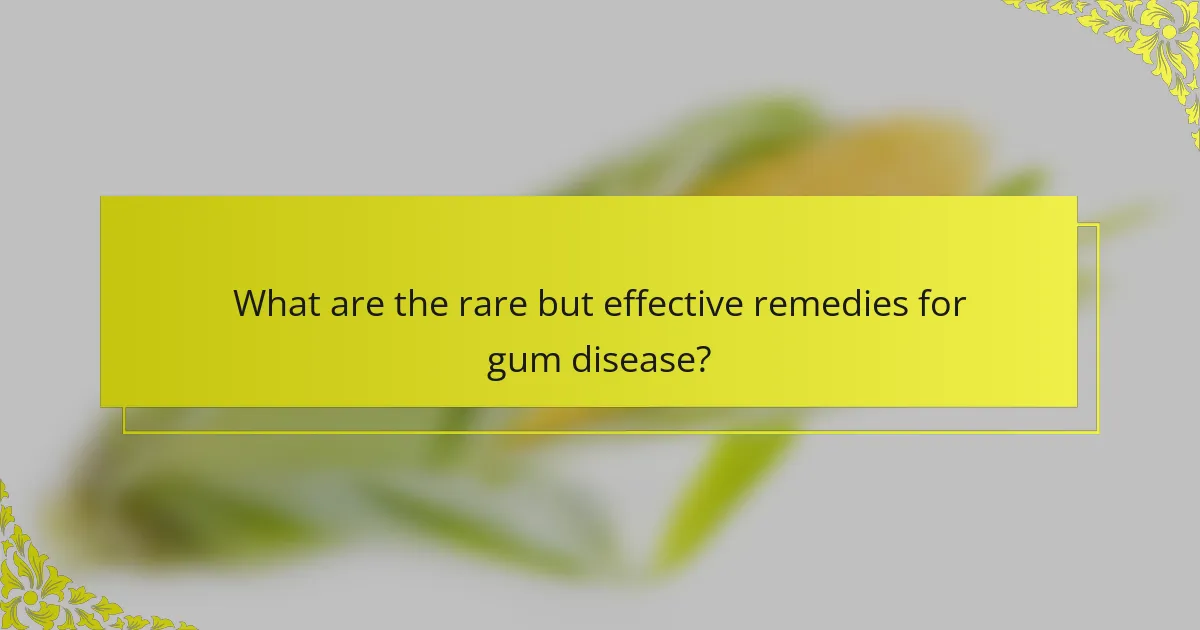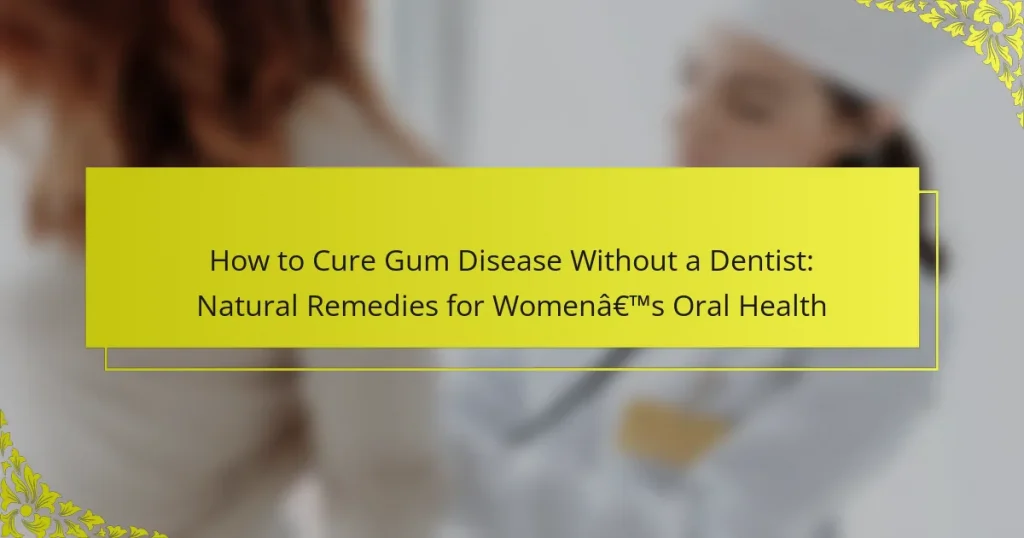Gum disease can significantly impact oral health, but natural remedies offer effective alternatives to dental treatments. Explore herbal rinses, oil pulling, and dietary changes to reduce inflammation. Discover how saltwater rinses and tea tree oil can support gum health. Learn about the benefits of vitamins C and D for maintaining healthy gums.

What are the natural remedies for gum disease?
Natural remedies for gum disease include herbal rinses, oil pulling, and dietary changes. Herbal rinses with sage or chamomile can reduce inflammation. Oil pulling with coconut oil may decrease bacteria. A diet rich in vitamins C and D supports gum health. Regular oral hygiene practices are essential for effectiveness.
How does gum disease specifically affect women’s oral health?
Gum disease can significantly impact women’s oral health by increasing the risk of tooth loss and exacerbating hormonal changes. Women may experience more severe symptoms due to hormonal fluctuations, especially during menstruation, pregnancy, and menopause. These changes can lead to increased inflammation and susceptibility to gum infections. Effective natural remedies include maintaining proper oral hygiene, using herbal rinses, and incorporating anti-inflammatory foods into the diet. Regular monitoring and proactive care are essential for managing gum health in women.
What are the common symptoms of gum disease?
Common symptoms of gum disease include swollen gums, bleeding during brushing, persistent bad breath, and receding gums. These signs indicate inflammation and infection, which can worsen without intervention. Early detection through awareness of these symptoms is crucial for effective natural remedies.
How can I identify early signs of gum disease?
To identify early signs of gum disease, look for swollen gums, bleeding during brushing, persistent bad breath, and receding gum lines. These symptoms indicate inflammation and potential infection, requiring attention. Regular self-examinations can help monitor oral health effectively.
What are the stages of gum disease?
The stages of gum disease include gingivitis, periodontitis, and advanced periodontitis. Gingivitis is the initial stage characterized by inflammation and bleeding of the gums. If untreated, it progresses to periodontitis, where the supporting structures of the teeth begin to deteriorate. Advanced periodontitis is the final stage, leading to tooth loss and severe damage to the bone. Early intervention with natural remedies can help reverse gingivitis and improve overall oral health.

What are the universal natural remedies for gum disease?
Natural remedies for gum disease include saltwater rinses, oil pulling, and herbal treatments like tea tree oil. These methods help reduce inflammation and promote oral health. Saltwater rinses can alleviate pain and kill bacteria, while oil pulling removes toxins. Tea tree oil possesses antibacterial properties, making it effective against gum disease. Regular use of these remedies can support women’s oral health naturally.
How can proper oral hygiene help cure gum disease?
Proper oral hygiene can significantly help cure gum disease by reducing plaque buildup and inflammation. Regular brushing and flossing remove food particles and bacteria, preventing further infection. Using antibacterial mouthwash can enhance this effect. Studies show that consistent oral care can lead to a 50% reduction in gum disease symptoms within weeks.
What are the best brushing and flossing techniques?
Effective brushing and flossing techniques are essential for maintaining gum health. Use a soft-bristled toothbrush and fluoride toothpaste. Brush for two minutes, covering all surfaces of each tooth. Floss daily, gently sliding the floss between teeth and curving it around each tooth base. This method removes plaque and food particles, reducing gum disease risk.
What dietary changes can support gum health?
Incorporating specific dietary changes can significantly enhance gum health. Focus on foods rich in vitamin C, such as citrus fruits and leafy greens, as they support collagen production and tissue repair. Omega-3 fatty acids, found in fish like salmon, reduce inflammation and promote healing. Additionally, consuming probiotics from yogurt or fermented foods can balance oral bacteria, contributing to better gum health. Lastly, staying hydrated aids in saliva production, which helps protect against gum disease.
Which vitamins and minerals are essential for gum health?
Vitamin C, vitamin D, calcium, and magnesium are essential for gum health. Vitamin C supports collagen production, crucial for gum tissue integrity. Vitamin D enhances calcium absorption, vital for bone and gum strength. Calcium and magnesium maintain overall oral health and help prevent gum disease.
What foods should be avoided to prevent gum disease?
To prevent gum disease, avoid sugary foods, acidic foods, and processed snacks. These items contribute to plaque buildup, which can lead to gum inflammation.
Sugary foods promote bacterial growth, while acidic foods can erode tooth enamel. Processed snacks often contain additives that can irritate gums.
Focusing on a diet rich in whole foods, such as fruits, vegetables, and whole grains, can support oral health and reduce the risk of gum disease.

What unique natural treatments exist for women?
Natural treatments for women’s oral health include several effective remedies for gum disease. Herbal rinses, such as sage or chamomile, can reduce inflammation. Oil pulling with coconut oil may help remove bacteria. Aloe vera gel applied to the gums promotes healing. A diet rich in vitamins C and D supports gum health. Regular hydration is essential for maintaining moisture in the mouth.
How can herbal remedies aid in gum disease treatment?
Herbal remedies can effectively support gum disease treatment through natural anti-inflammatory and antibacterial properties. Ingredients like sage, chamomile, and clove oil help reduce inflammation and fight bacteria. Sage contains unique compounds that promote oral health, while chamomile aids in soothing irritated gums. Clove oil’s rare attribute of analgesic properties provides pain relief. Regular use of these remedies can enhance overall oral health and complement dental care.
What are the benefits of using essential oils?
Essential oils can support oral health by reducing inflammation, fighting bacteria, and promoting healing. They may help alleviate gum disease symptoms and enhance overall oral hygiene. For example, tea tree oil has strong antibacterial properties, while peppermint oil can provide a soothing effect.
Are there specific mouthwashes that can help?
Certain mouthwashes can help manage gum disease by reducing inflammation and bacteria. Look for mouthwashes containing chlorhexidine, essential oils, or aloe vera. Chlorhexidine is a unique attribute known for its antibacterial properties, effective in treating gingivitis. Essential oils like tea tree oil can provide natural antimicrobial benefits. Aloe vera offers soothing effects and promotes healing. Regular use of these mouthwashes can support overall oral health and complement natural remedies for gum disease.
What ingredients should I look for in a natural mouthwash?
Look for natural mouthwash ingredients like aloe vera, tea tree oil, and xylitol. These components promote gum health and combat bacteria. Aloe vera soothes gum inflammation, tea tree oil has antimicrobial properties, and xylitol helps reduce cavity-causing bacteria.

What are the rare but effective remedies for gum disease?
Natural remedies for gum disease include rare but effective options like oil pulling, myrrh, and turmeric. Oil pulling involves swishing coconut or sesame oil in the mouth to reduce bacteria. Myrrh has anti-inflammatory properties that can soothe gums. Turmeric contains curcumin, known for its antibacterial effects. These remedies can support women’s oral health and may provide relief without dental intervention.
How can probiotics contribute to oral health?
Probiotics can significantly enhance oral health by balancing oral microbiota and reducing harmful bacteria. They prevent gum disease by promoting beneficial bacteria that inhibit pathogens. Research indicates that certain probiotic strains can lower inflammation and improve gum health, thus offering a natural remedy for women seeking to cure gum disease without dental intervention.
What role does oil pulling play in gum disease management?
Oil pulling can significantly aid in gum disease management by reducing harmful bacteria and promoting oral hygiene. This ancient practice involves swishing oil, typically coconut or sesame, in the mouth for 15-20 minutes. Research indicates that oil pulling can decrease plaque accumulation and improve gum health by minimizing inflammation. Regular use may lead to fresher breath and a healthier oral environment, making it a valuable natural remedy for women seeking alternatives to conventional dental treatments.

What are the best practices to maintain gum health?
To maintain gum health, practice good oral hygiene, including regular brushing and flossing. Use natural remedies like saltwater rinses and herbal mouthwashes to reduce inflammation. A balanced diet rich in vitamins C and D supports gum tissue health. Regular dental check-ups, even if avoiding treatment, ensure early detection of issues.
How often should I visit a dentist for check-ups?
Visit a dentist for check-ups every six months to maintain optimal oral health. Regular visits help detect gum disease early and allow for timely intervention. For women, natural remedies can complement dental care, such as oil pulling and herbal rinses. These practices support gum health but should not replace professional check-ups.
What lifestyle changes can enhance oral health?
To enhance oral health and potentially cure gum disease without a dentist, women can adopt several lifestyle changes. These include maintaining a balanced diet rich in vitamins and minerals, practicing regular oral hygiene, and using natural remedies like oil pulling and herbal rinses.
A diet high in fruits and vegetables provides essential nutrients, especially vitamin C, which is crucial for gum health. Regular brushing and flossing remove plaque and prevent inflammation. Oil pulling with coconut oil can reduce harmful bacteria, while herbal rinses using sage or chamomile may soothe gum irritation.
Staying hydrated supports saliva production, which is vital for oral health. Additionally, avoiding tobacco and limiting sugar intake can significantly reduce the risk of gum disease.
Incorporating these changes can lead to improved gum health and overall oral hygiene.
What common mistakes should I avoid when treating gum disease?
To effectively treat gum disease without a dentist, avoid common mistakes. Neglecting proper oral hygiene can exacerbate the condition. Skipping regular brushing and flossing allows plaque buildup, worsening gum health. Relying solely on natural remedies without professional advice can lead to ineffective treatment. Additionally, ignoring dietary impacts on oral health may hinder recovery. Finally, underestimating the importance of consistent follow-up care can result in recurring issues.
What expert insights can help optimize my oral care routine?
To optimize your oral care routine, consider incorporating natural remedies that effectively address gum disease. Regular use of saltwater rinses can reduce inflammation and promote healing. Additionally, applying aloe vera gel directly to the gums offers unique antibacterial properties. Using essential oils like tea tree oil in diluted form can enhance oral hygiene due to their rare antimicrobial effects. Finally, maintaining a balanced diet rich in vitamins C and D supports overall gum health.




